Key takeaways:
- Self-discipline is crucial for online learning, emphasizing the balance between freedom and commitment.
- Engaging with a community enriches the learning experience, offering diverse perspectives that can ignite new ideas.
- Setting clear goals and actively practicing skills enhances knowledge retention and builds confidence.
- Applying learned knowledge through real-world projects fosters creativity and adaptability, even amid challenges.
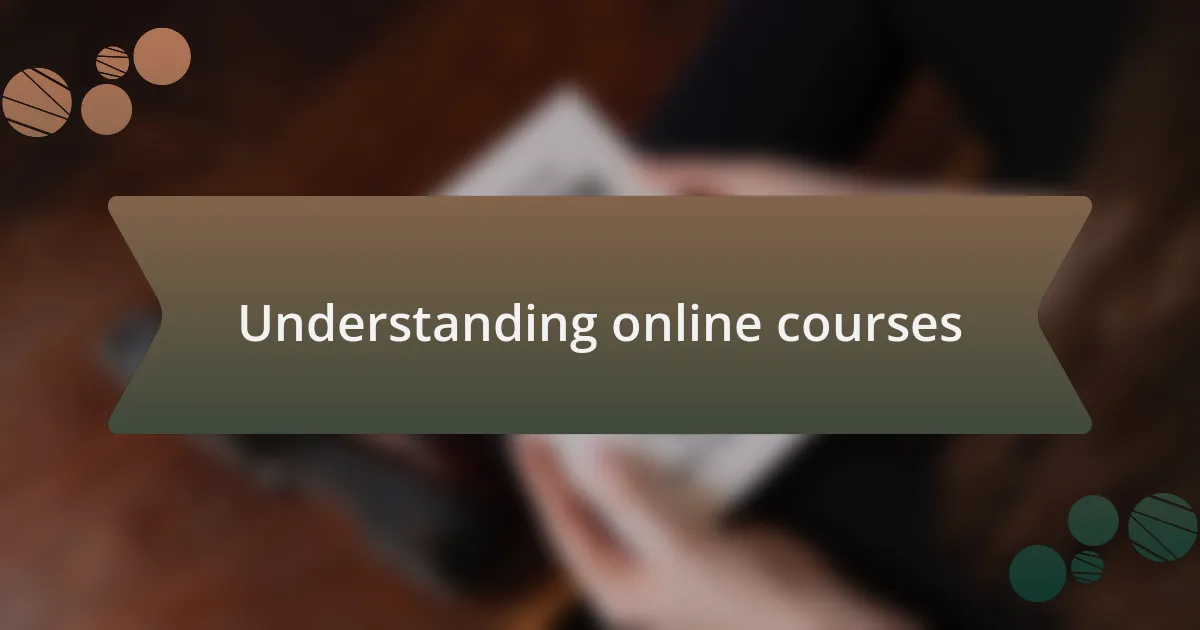
Understanding online courses
Online courses have transformed the learning landscape, making education more accessible than ever. I remember when I first started exploring platforms like Coursera and Udemy. The variety of subjects felt overwhelming, yet exciting – it seemed like stepping into a vast library where every book was a promise of new knowledge.
One of the most significant insights I’ve gained is the importance of self-discipline. In my experience, the freedom to choose when and how to study can be both liberating and daunting. Have you ever felt that rush of procrastination creeping in when no one is watching? I’ve certainly battled that urge, reminding myself that the joy of learning is worth a bit of effort and commitment.
Moreover, I’ve learned that online courses often emphasize practical skills alongside theoretical knowledge. For instance, I enrolled in a marketing course, where the hands-on projects not only solidified my learning but also provided real-world experience. That blend of theory and practice is essential, don’t you think? It’s fascinating how online learning can mirror real-life applications and foster a sense of community among learners from different backgrounds.
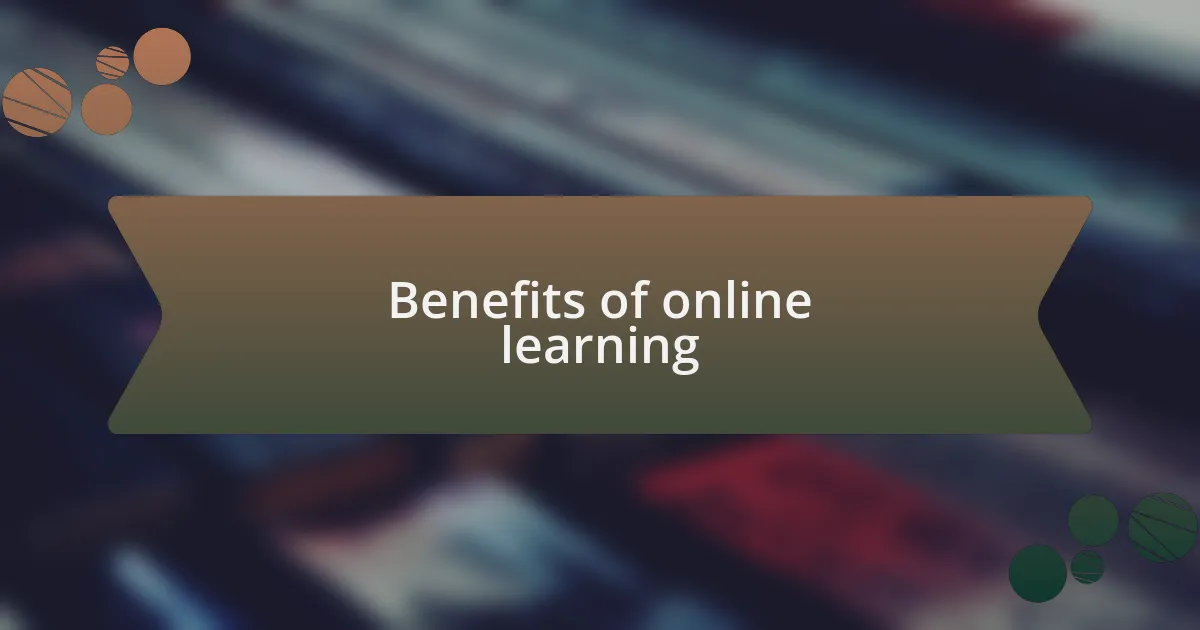
Benefits of online learning
Online learning offers incredible flexibility, allowing me to balance my studies with personal commitments. I recall juggling a course while working on a project for my job, and it was so empowering to carve out time during my lunch break or late at night to dive into lessons. Can you imagine the freedom of learning at your own pace, on your own schedule? It’s a game-changer.
One of the most unexpected benefits I’ve experienced is the diverse community that online programs foster. I vividly remember a discussion in a forum where a fellow learner from another country shared their perspective on a topic I thought I knew well. It was enlightening to hear their insights, broadening my understanding and sparking new ideas. Isn’t it remarkable how a simple conversation can ignite a fresh way of thinking?
Additionally, the abundance of resources available in online courses cannot be overstated. I’ve often found myself immersed in supplementary materials like videos, articles, and forums that complement the main curriculum. There’s a certain thrill in exploring these extras, as they often lead me to unexpected discoveries that enrich my learning journey. Have you ever stumbled upon a resource that changed your perspective entirely? Those moments are what make online learning truly rewarding.
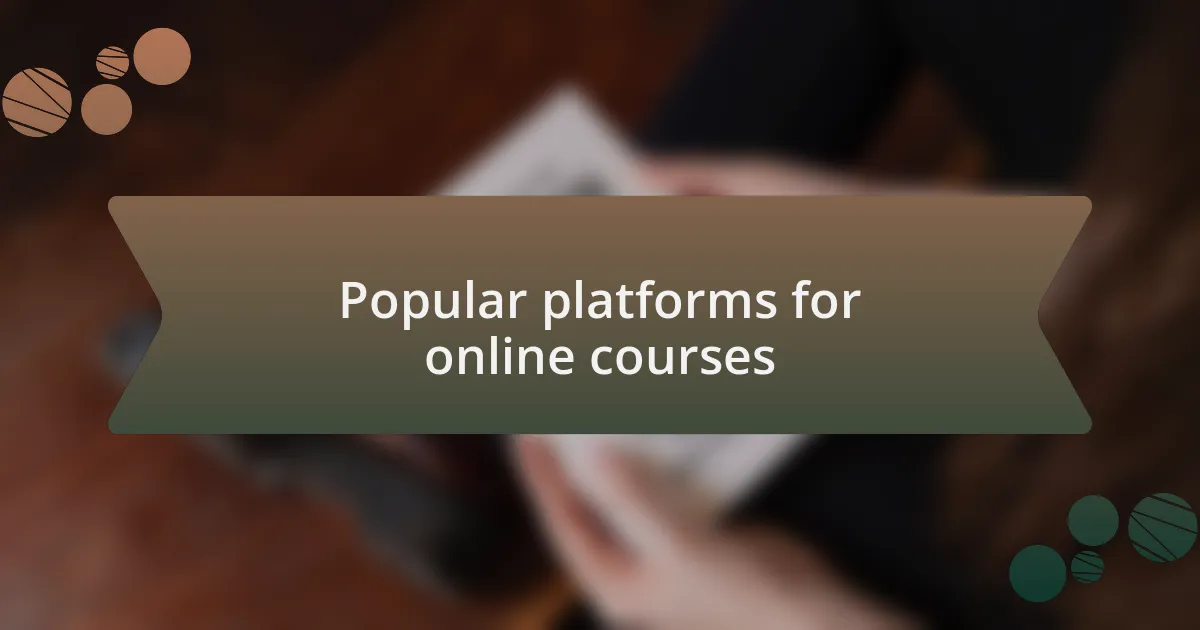
Popular platforms for online courses
When it comes to popular platforms for online courses, I’ve had great experiences with sites like Coursera and Udemy. Both have extensive course catalogs that cater to various interests and expertise levels. I remember signing up for a course on digital marketing through Coursera, which was led by professors from a top university. The quality of the content was impressive, and it felt like I was receiving a premium education from the comfort of my home. Have you ever found a course that just clicked with you?
Another well-known platform is Khan Academy, which I discovered during a search for resources in mathematics. Their user-friendly interface and engaging videos have been invaluable for learners of all ages. I often refer back to their lessons when brushing up on complex topics. Thinking about how a simple platform can support learners from school children to adults is quite fascinating, isn’t it?
Then there’s Skillshare, which stands out for its focus on creative skills. I once took a class on photography there, sparked by my passion for capturing moments. The hands-on projects and active community feedback made the experience feel lively and interactive. Have you ever participated in a course where the community was just as impactful as the content? For me, it highlighted the idea that learning can be both fun and collaborative.
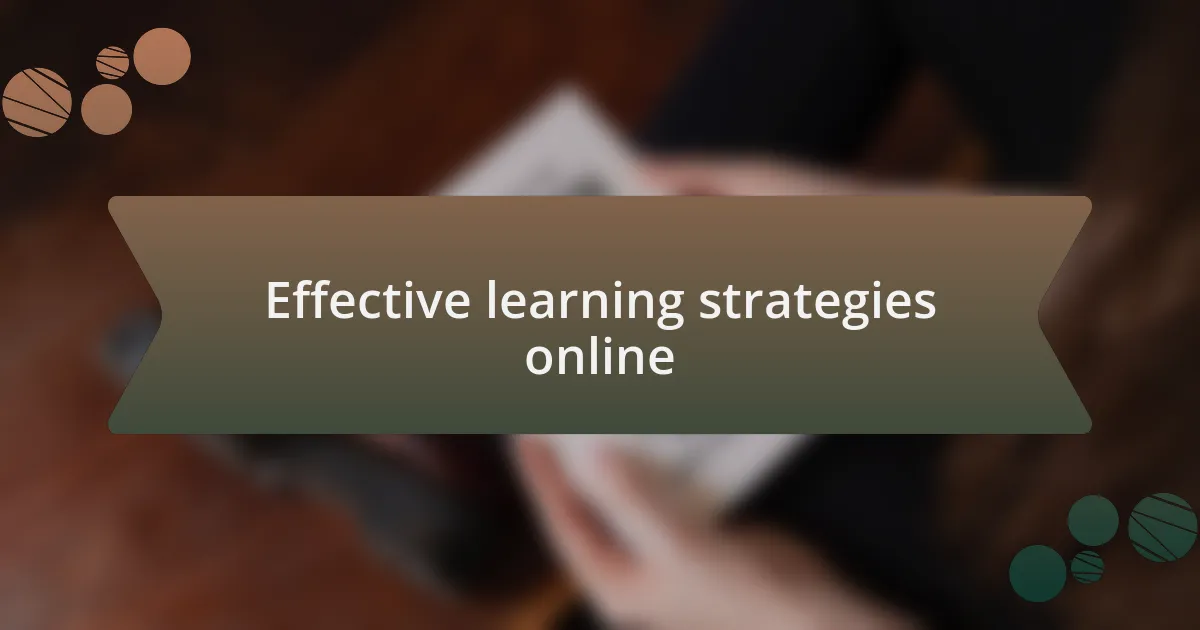
Effective learning strategies online
In my experience, one of the most effective learning strategies online is setting clear goals for what I want to achieve from a course. When I took an online writing workshop, I began with the objective to improve my storytelling skills. By breaking down my overall goal into smaller, manageable tasks, I found that I could focus better and track my progress effectively. Have you ever noticed how having specific targets keeps you motivated?
Another tip I recommend is to engage actively with the content. When I was enrolled in a coding bootcamp, I realized that merely watching the videos wasn’t enough; I needed to practice the skills I was learning. By applying what I learned through hands-on projects, I not only reinforced my knowledge but also gained confidence in my abilities. Isn’t it amazing how putting theory into action can transform understanding?
Lastly, finding a study group can be incredibly beneficial. During an online course on graphic design, I connected with fellow learners through discussion forums. These interactions not only provided diverse perspectives but also helped me stay accountable. I often think about how much richer my learning experience became simply by sharing insights and challenges with others. Have you ever experienced that sense of community in your learning journey?
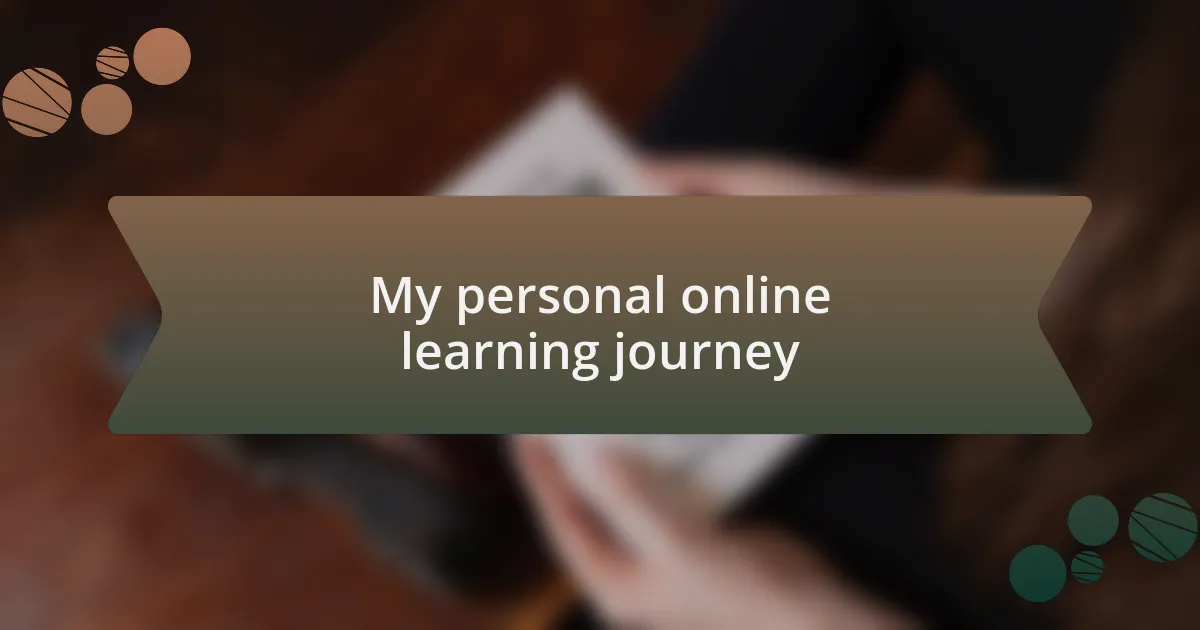
My personal online learning journey
My journey through online learning has been both enlightening and transformative. I vividly remember signing up for an online marketing course, feeling both excitement and trepidation. Initially, I struggled to stay engaged with the material, often distracted by daily life. However, when I made the decision to carve out specific time slots in my week dedicated solely to learning, everything changed. Have you ever experienced that “aha!” moment when commitment aligns with your ambitions?
As I progressed, I found that reflection played a crucial role in my understanding. After finishing each module, I would take moments to jot down my thoughts about what I had learned. One instance that stands out was while studying digital content creation—I realized that sharing my insights in a personal blog not only helped me synthesize the information but also connected me with others who shared similar interests. Does reflecting on your learning not deepen your grasp of the subject matter?
Another memorable aspect of my online learning journey has been the power of adaptability. In a course focused on entrepreneurship, we were encouraged to share our challenges and successes. It was through reading the struggles of others that I felt less alone in my own journey. Those moments of vulnerability made me appreciate the diverse experiences and the collective learning we were all part of. Isn’t it fascinating how our individual paths can intersect and create a larger picture of growth and understanding?
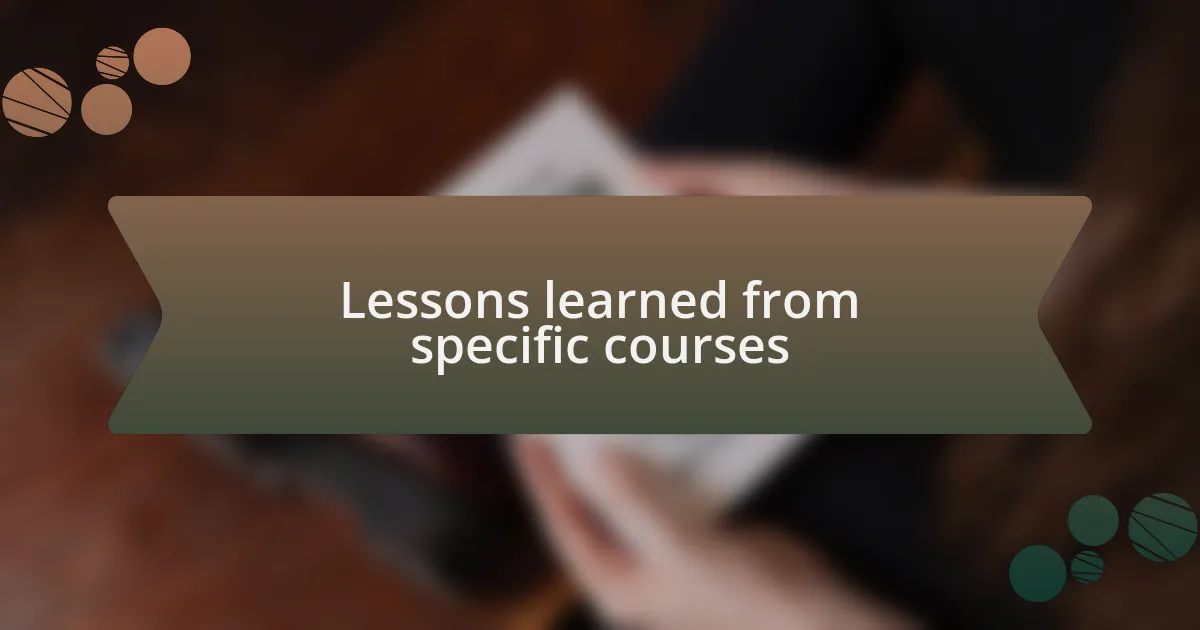
Lessons learned from specific courses
One course that profoundly impacted me was focused on data analysis. Initially, I felt overwhelmed by the range of statistical concepts, but slowly, through hands-on projects, I began to see the beauty in numbers. I remember the moment when I created a visual representation of data trends for a project; the clarity it brought to complex information was exhilarating. Have you ever felt that rush of excitement when theory transforms into practical application?
In another course about graphic design, I faced my insecurities about my creativity. Each assignment pushed me out of my comfort zone, leading to moments of both frustration and breakthrough. I recall spending late nights experimenting with color palettes and layouts, only to discover my unique style emerging. Isn’t it interesting how challenges can often unveil hidden talents that we didn’t know we possessed?
Finally, a course on public speaking taught me invaluable lessons about self-confidence and articulation. I was terrified during the initial presentations, but continuous feedback helped me refine my delivery. A pivotal moment came when I received positive comments from peers, which motivated me to embrace my voice. Have you ever realized that the support of others can be a game-changer in overcoming personal barriers?
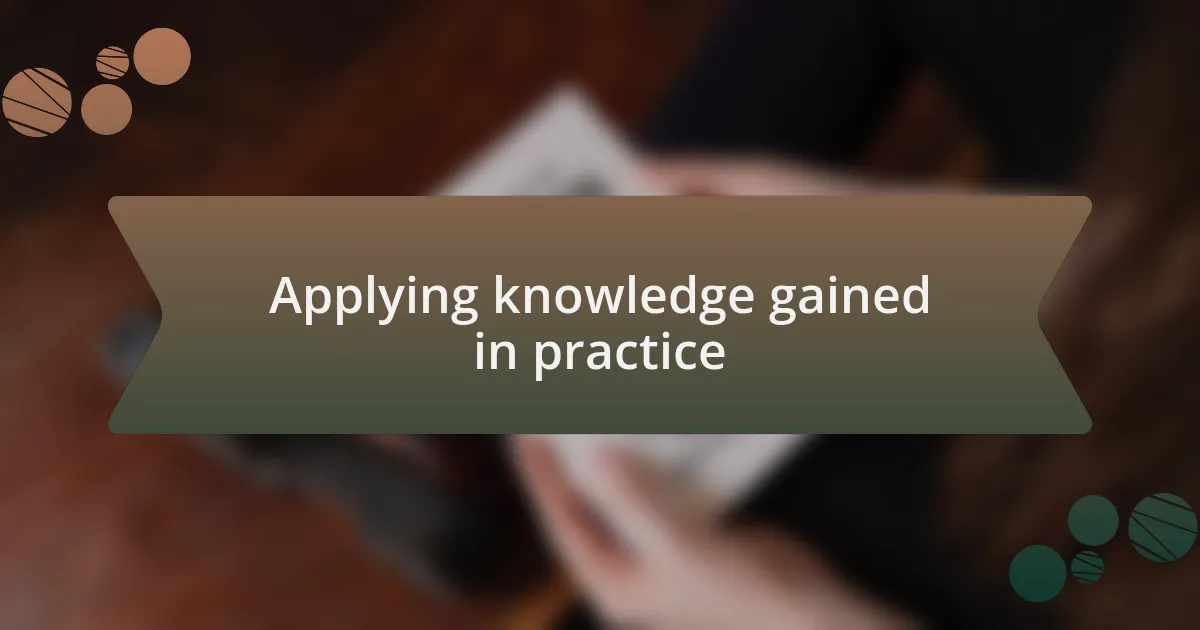
Applying knowledge gained in practice
Applying knowledge in practice often requires a willingness to experiment and adapt. For instance, after completing a digital marketing course, I took it upon myself to launch a small social media campaign for a local charity event. I vividly remember the mix of exhilaration and anxiety as I crafted the posts, drawing on the strategies I had learned. Did I feel unprepared? Absolutely. But that uncertainty pushed me to think creatively, ultimately resulting in increased engagement and donations.
Sometimes, the application of what we’ve learned doesn’t go as planned, and that’s part of the journey. I recall attempting to implement project management techniques from an online course when working on a group project. Initially, I felt overwhelmed trying to coordinate everyone’s tasks effectively. However, when setbacks arose, I leaned into our collective problem-solving skills, finding that those methods were more adaptable than I initially had thought. Isn’t it fascinating how the process itself can offer lessons even when the execution isn’t perfect?
Then there’s the moment of realization when everything clicks. After diving deep into a financial literacy course, I felt empowered enough to manage my personal budget with newfound confidence. I remember feeling a sense of control as I tracked my expenses for the first time, something I’d previously found daunting. Have you ever experienced that satisfying transition from confusion to clarity? That feeling of mastery not only reinforced my learning but also motivated me to continue exploring complex financial concepts.